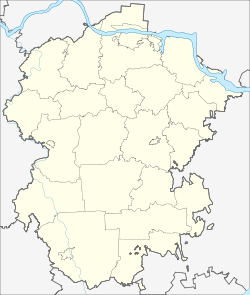Cheboksary, Russia
| Cheboksary (English) Чебоксары (Russian) Шупашкар (Chuvash) |
|
|---|---|
| - City - | |
 Left to right, top to bottom: A View of Red Square from Cheboksary Bay on Chuvash Republic Day; Hospital Square, Universitetskaya Street; Cheboksary Airport, Chapayev Monument on Chapayev Square; Chuvash State Agricultural Academy |
|
 Location of the Chuvash Republic in Russia |
|
|
|
|
|
|
|
|
|
|
| Anthem | Anthem of Cheboksary |
| City Day | Third Sunday of August |
| Administrative status (as of July 2013) | |
| Country | Russia |
| Federal subject | Chuvash Republic |
| Administratively subordinated to | city of republic significance of Cheboksary |
| Capital of | Chuvash Republic |
| Administrative center of | city of republic significance of Cheboksary |
| Municipal status (as of November 2011) | |
| Urban okrug | Cheboksary Urban Okrug |
| Administrative center of | Cheboksary Urban Okrug |
| Head | Leonid Cherkesov |
| Representative body | City Assembly of Deputies |
| Statistics | |
| Area (city) (2012) | 250.9 km2 (96.9 sq mi) |
| Population (2010 Census) | 453,721 inhabitants |
| - Rank in 2010 | 39th |
| Population (January 2014 est.) | 468,725 inhabitants |
| Density | 1,808/km2 (4,680/sq mi) |
| Time zone | MSK (UTC+03:00) |
| First mentioned | 1469 |
| City status since | 1781 |
| Postal code(s) | 428000–428006, 428008–428015, 428017–428025, 428027–428029,428031, 428032, 428034–428038, 428899, 428999, 996200 |
| Dialing code(s) | +7 8352 |
|
|
|
| on | |
Cheboksary (Russian: Чебоксары; IPA: [tɕɪbɐˈksarɨ]; Chuvash: Шупашкар, Šupaškar) is the capital city of Chuvashia, Russia and a port on the Volga River. Population: 453,721 (2010 Census);440,621 (2002 Census);419,592 (1989 Census).
The city is located in the Volga Upland region and stands on the shore of the Cheboksary Reservoir. Its area is 250.9 square kilometers (96.9 sq mi). The satellite city of Novocheboksarsk is located about 6 kilometers (3.7 mi) east of Cheboksary.
It was first mentioned in written sources in 1469, when Russian soldiers passed here on their way to the Khanate of Kazan. According to archaeological excavations, however, the area had been populated considerably earlier. The site hosted a Bulgarian city of Veda Suvar, which appeared after Mongols defeated major Volga Bulgarian cities in the 13th century. During Khanate period the town is believed by some to have had a Turkic (probably, Tatar) name Çabaqsar and that the current Russian and English names originate from it. However, in maps by European travelers it was marked as Cibocar (Pizzigano, 1367), Veda-Suar (Fra Mauro, 1459). Shupashcar, the Chuvash name literally means the "fortress" of the Chuvash.
...
Wikipedia



